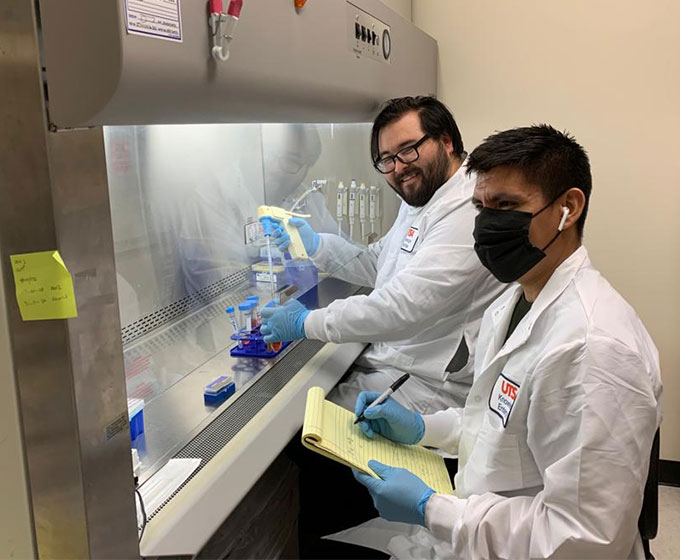
Nathan Kilgore (right) and Mario Ramirez (left) develop Lyme disease pathogens at a Biosafety Level 2 cabinet.
MARCH 28, 2022 — UTSA graduate students and postdoctoral fellows in the College of Sciences will have the opportunity to develop methods to prevent or reduce tick-borne infections with the support of two recent grants totaling $2,287,500 from the National Institutes of Health (NIH).
Janakiram Seshu, professor of bacterial pathogenesis in the UTSA Department of Molecular Microbiology and Immunology, is guiding the research efforts to study molecular mechanisms leading to Lyme disease. Seshu noted the dire need for studies in preventive and therapeutic strategies targeting the agent of Lyme disease, Borrelia burgdorferi.
Lyme disease is the most common tick-borne infection in the U.S., with around 40,000 confirmed and more than 10 times that number predicted to occur each year, according to the U.S. Centers for Disease Control and Prevention.
A two-year, $412,500 grant from NIH will support the study of host-pathogen interactions and how viruses sustain themselves within a host organism. It will also enhance the unique expertise and research infrastructure available at UTSA.
“We plan to expand the depth of knowledge on how the Lyme disease agent infects mammalian and tick cells at a single cell level using the UTSA Genomics Core, one of the leading centers in the country and the only center in South Texas that assists in profiling the genetics of an infected organism, in collaboration with Brian Hermann, an associate professor in the UTSA Department of Neuroscience, Developmental and Regenerative Biology,” Seshu said.
A five-year, $1,875,000 grant will enable Sehsu’s investigative team to build on existing research findings to develop novel vaccines that reduce the rate of infection in animals that serve as the tick’s source of the Lyme disease pathogen.
Most cases of Lyme disease come from ticks that bite humans after they have acquired the agent of Lyme disease from infected animals. Blocking this natural cycle of infection between various animals and ticks, Seshu believes, will be another tool to reduce the incidence of Lyme disease.
Seshu plans to produce a vaccine to reduce the transmission of infection between animals and ticks by using purified components from strains of the Lyme disease bacteria that are regulated. Once modified, the vaccine will be delivered orally to small rodents. These vaccines could also be modified to block multiple pathogens that are transmitted via ticks, Seshu explained.
The vaccine studies are a collaborative effort with Chiung-Yu Hung, associate professor in the UTSA Department of Molecular Microbiology and Immunology, and Kelly Nash, associate professor in the Department of Physics and Astronomy.
“We are looking for graduate students and post-doctoral fellows to join our laboratories to tackle an infectious disease with significant public health importance in the U.S. and other parts of the world. These studies can be readily extended to developing strategies to prevent vector-borne diseases of relevance to human health and for animal agriculture,” added Seshu. “Gaining proficiency in using cutting-edge technologies as part of these studies are bound to open doors for trainees both in industry settings and in academia to address the current and emerging challenges in infectious diseases.”
Seshu’s research is supported by the National Institutes of Health (NIH, NIAID, AI149263, AI152233grants) and Bay Area Lyme Foundation.
UTSA Today is produced by University Communications and Marketing, the official news source of The University of Texas at San Antonio. Send your feedback to news@utsa.edu. Keep up-to-date on UTSA news by visiting UTSA Today. Connect with UTSA online at Facebook, Twitter, Youtube and Instagram.
Move In To COLFA is strongly recommended for new students in COLFA. It gives you the chance to learn about the Student Success Center, campus resources and meet new friends!
Academic Classroom: Lecture Hall (MH 2.01.10,) McKinney Humanities BldgWe invite you to join us for Birds Up! Downtown, an exciting welcome back event designed to connect students with the different departments at the Downtown Campus. Students will have the opportunity to learn about some of the departments on campus, gain access to different resources, and collect some giveaways!
Bill Miller PlazaCome and celebrate this year's homecoming at the Downtown Campus with food, games, giveaways, music, and more. We look forward to seeing your Roadrunner Spirit!
Bill Miller PlazaThe University of Texas at San Antonio is dedicated to the advancement of knowledge through research and discovery, teaching and learning, community engagement and public service. As an institution of access and excellence, UTSA embraces multicultural traditions and serves as a center for intellectual and creative resources as well as a catalyst for socioeconomic development and the commercialization of intellectual property - for Texas, the nation and the world.
To be a premier public research university, providing access to educational excellence and preparing citizen leaders for the global environment.
We encourage an environment of dialogue and discovery, where integrity, excellence, respect, collaboration and innovation are fostered.